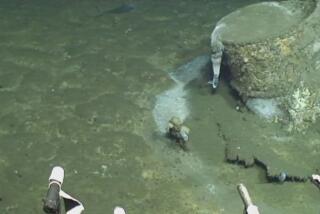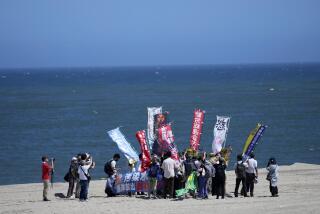Russia Calls Off Nuclear Dumping in Sea
MOSCOW â Yielding to protests from Japan and the United States, Russia agreed Thursday to stop dumping liquid radioactive waste into the Sea of Japan but warned that it will resume the practice unless richer countries help it process the waste for underground burial.
Environment Minister Viktor Danilov-Danilyan announced the decision after a Cabinet meeting. He said Russia will refrain from further dumping âin the near future.â
In return, Japan agreed to an urgent meeting of Russian and Japanese atomic experts in Tokyo today to consider building waste disposal facilities on land in eastern Russia. They would be financed with part of the $100 million that the Japanese have promised Russia to help it dismantle nuclear weapons.
Russia caused an uproar when its navy barges pumped 900 metric tons of waste through a hose Sunday into waters 330 miles west of the Japanese island of Hokkaido. The waste, residue from cleaning and deactivating nuclear-powered submarines of Russiaâs Pacific Fleet, had a low level of radioactivity but caused concern in Japan over possible fish contamination.
The Japanese were outraged that Russia not only violated a 1983 international moratorium on such dumping but acted within a week after Russian President Boris N. Yeltsinâs goodwill visit to Tokyo and did not inform their government in advance. The environmental group Greenpeace first disclosed the incident after one of its ships trailed the Russian barges to the dump site.
After twice calling in the Russian ambassador and getting no satisfaction, Japanese Foreign Minister Tsutomo Hata took the unusual step Wednesday of telephoning his Russian counterpart, Andrei V. Kozyrev, to press for a commitment to stop the dumping.
According to an account of their 20-minute conversation in the Russian newspaper Izvestia, Hata indicated that Japan is willing to help solve Moscowâs waste disposal problem and Kozyrev agreed to relay Japanâs concerns to Yeltsin.
American officials also called for a halt in the dumping, making it clear that Secretary of State Warren Christopher, who is to meet with Yeltsin here today, will press Japanâs case if the matter is not resolved. Kozyrev joined Danilov-Danilyan, the environment minister, in urging a halt to dumping, which was decided by Prime Minister Viktor S. Chernomyrdin.
Masayoshi Takemura, a government spokesman in Tokyo, said Japan welcomed Russiaâs âquick political decision to accept our protest.â
But Danilov-Danilyan said Russia had decided only to call off the scheduled Nov. 15 dumping of a second load of radioactive waste in the Sea of Japan. He warned that it may eventually have to resume dumping; there are not enough storage facilities for the 20,000 cubic meters of liquid waste produced by Russiaâs nuclear subs each year, he said, and it is too dangerous to keep the stuff on leaky tankers in port.
Besides, he added, it will take time and millions of dollars in foreign aid to build enough plants to turn the liquid waste into solids that can be buried. âIf these facilities are built quickly, it will probably allow us to prevent the dumping of any more waste,â he told reporters. âIf it takes, for instance, a year and a half to build them, Russia will be compelled to dump more waste into the sea.â
In an interview, Alexei Yablokov, Yeltsinâs top ecological adviser, said one such plant would take two to five years to build.
Japanese help for such a project is not assured. Officials in Tokyo said they must be certain that, by aiding in the disposal of submarine waste, they would not, in effect, be giving military aid to keep Russiaâs Pacific Fleet running.
A new test of Russiaâs intentions will come next month when its delegates meet with other signers of the 1972 London Convention on nuclear waste disposal to consider incorporating the voluntary 1983 moratorium on ocean dumping into their treaty. Danilov-Danilyan said Russia favors such a permanent dumping ban, âbut the details of the timing of when it is to be imposed are negotiable.â
While claiming to disapprove of ocean dumping as a principle, he insisted that the waste dumped Sunday posed no threat to marine life. He denied that Russia had violated its international obligations, saying the London treaty covers only highly radioactive waste.
But the minister was challenged at his news conference by Greenpeace activist Joshua Handler, who said the 1983 voluntary ban covers low-level wastes and is as binding under international law as the treaty itself.
In a testy exchange, Danilov-Danilyan accused Greenpeace of âstirring up hysteriaâ over the dumping. âThis problem is hyper-exaggerated,â he said. âI have much more serious ecological problems to deal with.â
More to Read
Sign up for Essential California
The most important California stories and recommendations in your inbox every morning.
You may occasionally receive promotional content from the Los Angeles Times.










